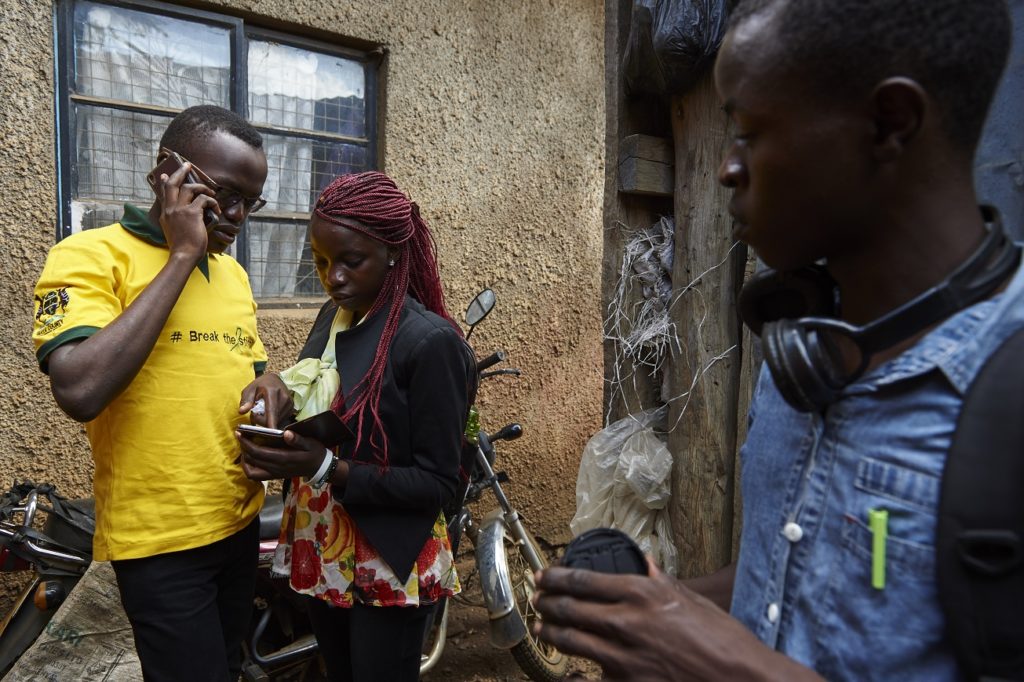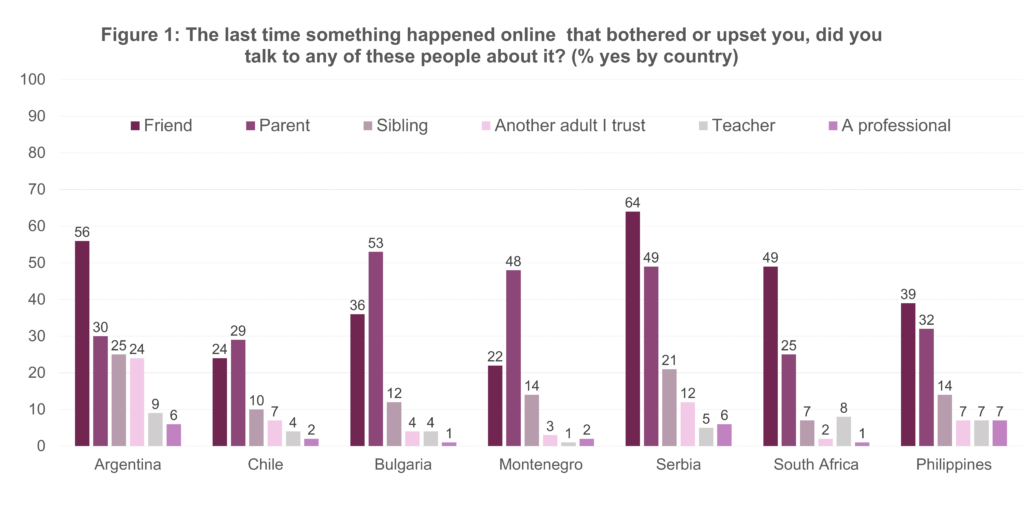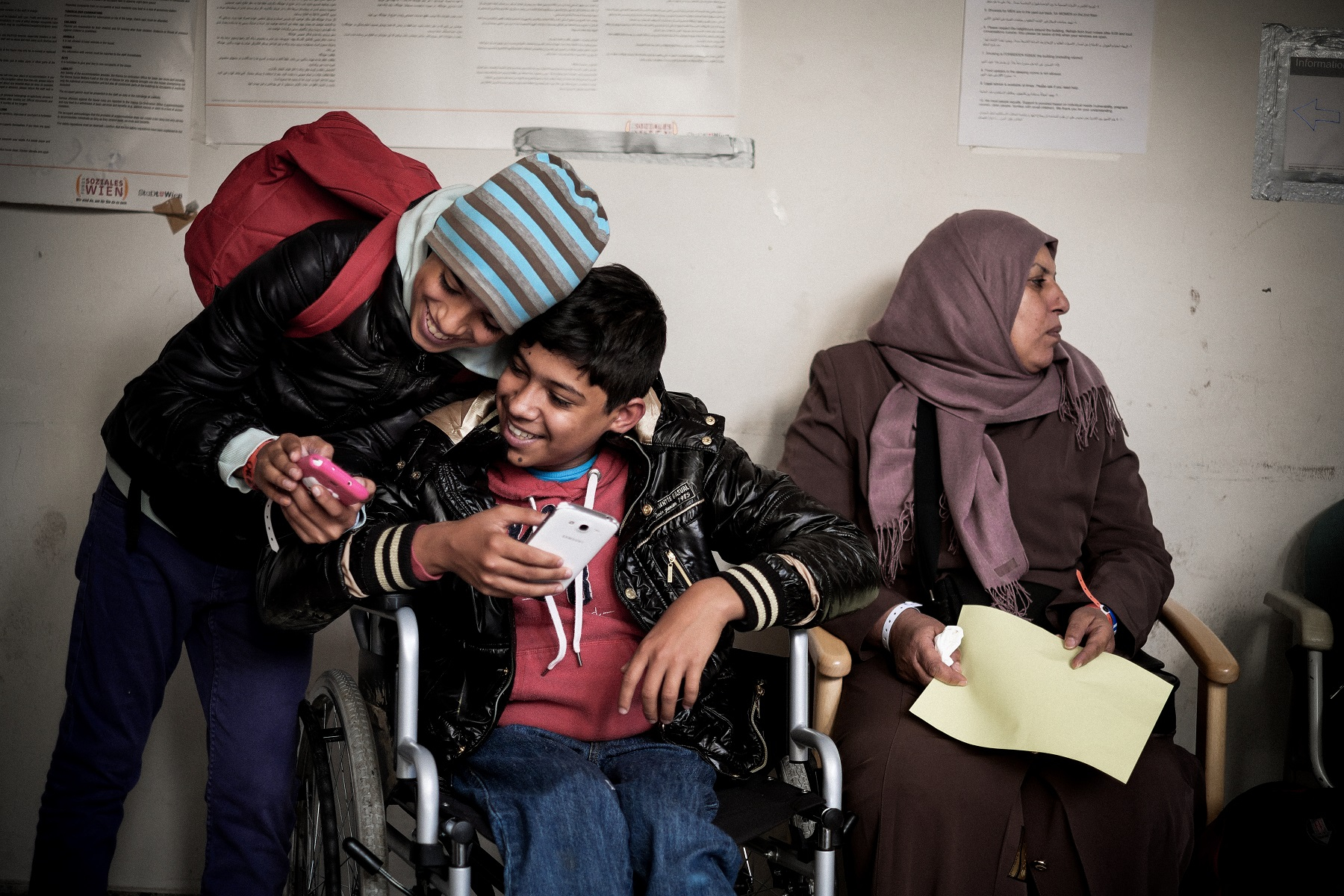全球父母在这数码时代面对的挑战
2018-02-07
© UNICEF/UN08733/Ashley Gilbertson
两名伊拉克男童在奥地利维也纳的难民处理中心兴奋地使用手机,他们的妈妈在轮候申请庇护。
全球越来越多儿童使用互联网,大部分是透过手机上网。不少家长感到自己的能力、角色和权威受到挑战。然而,儿童透过上网可以获得有用的知识和弥补与家长缺失的联系。究竟家长应何从选择?
数码教育鸿沟
在高收入国家进行的研究表明,越来越多父母从过往的管束教育,如禁止孩子使用互联网或会在孩子闯祸后责备他们,变为越来越多父母采用启发方式教育孩子,如分享自身的上网经验及指导孩子使用私隐设置、谘询服务和对网上内容及行为进行批判性评价。这种教育方式的转变不但因为家长在使用数码产品时获得经验和知识,还有赖政府、儿童福利机构和相关持分者为提高家长意识和鼓励他们参与而付出的成果。

© UNICEF/UN0147080/Shehzad Noorani
同伴倡导者在肯尼亚基苏木的尼亚兰大地区透过电话与朋友交流,他们的组织Sauti Skika由青年人管理和营运,为青年爱滋病病毒感染者发声,确保大众能聆听他们的声音。
可是在中等和低收入国家,家长似乎依然倾向管束教育。在这些国家的文化中,管教子女的方式更专制(尤其针对女儿)。缺乏资源亦是另一原因,焦虑的父母会认为采取管束教育是保护孩子的唯一方法。另外,社会未把儿童当成积极公民或数码公民也是原因之一。
很多发展中国家的儿童由亲戚如祖父母抚养。在非洲、部分拉丁美洲地区和加勒比海地区,很多儿童只与父母其中一方生活,甚至不与父母一起生活。鉴于移民、疾病、父母早逝等因素,令父母和监护人沒有足够资源和时间培养儿童的数码技能。学校同样也面对困难,发展中国家的学校入学率低、学生与老师人数比例过高、拥挤的课室和未经培训的老师司空见惯。因此,成年人无法提供支援和教导儿童安全使用网络、及在他们需要时提供帮助。
最新研究结果
了解家长和儿童在数码时代面对的限制,是寻求解决办法的第一步,这样才能将风险减至最低,同时帮助孩子最大程度地获得机会。我们在进行「全球儿童在綫」的研究,追踪身处数码时代的家长和儿童的行为和经歷。研究由联合国儿童基金会(UNICEF)英诺森提研究中心、伦敦政治经济学院和「欧盟儿童在綫」与全球各地研究人员和UNICEF地区办公室展开的跨国研究。研究目的是在儿童权益框架的指导下,寻找确切方案引发儿童对使用网络进行讨论和为政策落实提供参考。
![[RELEASE OBTAINED] (Left) Gaiela Vlad, 17, uses her phone to speak with her mother at the dinner table at the home of her foster mother Tatiana Gribincea (right) in the village of Porumbeni on the outskirts of Moldova, Monday 16 October 2017. The dinner was traditional Moldovan foods, washed down with home made wine and pressed berry juice for the children. During dinner, Gaiella called her mother Svetlana - usually she video chats with her mother during dinner, but tonight the internet connection failed them, and Svetlana chatted on speaker with her daughter, son, husband and friends. Moldova gained independence from the former USSR in 1991, and since then has regularly ranked as one of the worlds unhappiest countries. Moldova is the poorest nation in Europe - according to the World Bank, the average per capita G.D.P. in 2016 was $1,900. The country’s economy is reliant on agriculture and foreign remittances: at least one quarter of the population live and work aoad, sending pay home to support their families. With so many people leaving the country to find gainful employment, Moldova is officially the fastest shrinking country on earth. Gaiela Vlad is a seventeen-year-old student living in the village of Porumbeni, 10 miles (16 kilometres) from Chisinau, Moldova. In 2006, Gaiella’s mother Svetlana decided she needed to travel aoad in order to earn a higher income and provide her children with better opportunities. Before leaving Moldova, Svetlana worked in a printing house earning 2000 lei (USD$120) a month, and was unable to support her family financially. She now works as a nurse at a German nursing home for the elderly. The night before Svetlana left, the family gathered at the dinner table and Gaiela’s father, who works as a police detective and like all public employees in Moldova is very poorly remunerated, made a speech before they began: “Enjoy this, it’s the last time you’re going to eat this well until she comes home.”](/wp-content/uploads/2018/02/UN0139548_r-1024x683.jpg)
© UNICEF/UN0139548/Gilbertson V
2017年10月16日,在摩尔多瓦首都奇西瑙郊外的博鲁贝尼村,17岁的布里埃拉‧加比‧弗兰德(图左)在养母塔蒂亚娜‧格裏宾西(图右)家中用手机与在国外工作的妈妈聊天。
除了访问儿童的上网活动、次数、时间、技能、风险外,我们还试图了解儿童在网络上遇到负面事情时会向谁寻求帮助。令人惊讶的是,来自7个国家的大部分儿童首先会选择朋友,其次是家长,很少人选择老师或其他专业人士。这对家长是好消息,儘管根据保加利亚、黑山共和国和南非的调查显示,家长的数码技能水平仅相当于14岁儿童的水平,但儿童表示相信父母有能力支持和教导自己。
令人关注的是,与其它国家和地区相比,来自欧洲国家的儿童在网络遇到负面事情时会偏向告诉父母。这或能反映大部分欧洲家长采用启发教育方式而非管束教育。显然,南半球的家长需要更多资源支持他们学习和教育孩子的方法。更令人担忧的,是儿童明显对老师和专业人士缺乏信任。我们很想知道,是否专业人士无法达到我们期望的水平,以及儿童对专业人士能否提供正确建议感到沒有信心。

註释:受访对象除阿根廷13至17岁儿童外,还包括其余国家9至17岁儿童。塞尔维亚和菲律宾进行的是小规模试点调查;南非采用抽样调查;其余国家样本皆有全国代表性。有关更多细节,敬请参考:www.globalkidsonline.net/results
如何鼓励家长支持儿童?
如果家长保护孩子的主要方式是管束教育,那儘管能保护孩子的安全,但孩子却无法透过网络获得学习机会。管束教育可能剥夺儿童学习数码技能的机会,而这些技能会帮助他们面对和处理危险。我们应为家长提供甚么建议?身处数码时代的他们需要扮演甚么角色?他们需要具备甚么能力?我们在科技大爆炸前所采用的教育原则如今是否适用?
世界衞生组织在2007年制定关键指标的框架,用来衡量家长职责和教育方式为青少年成长带来的正面影响:
- 亲子关係(父母与孩子应建立正面稳定的关係)
- 行为控制(在相互信任的基础上监管和指导孩子)
- 尊重孩子,尤其是青少年
- 树立良好的榜样(孩子会模仿家长的言行)
- 物质支持和身心保护(来自家长和社区)
10年过去,这框架仍适用于现今的数码时代。以树立良好榜样为例:若家长整天亦机不离手,试问孩子又怎会不仿效呢?若家长采用管束教育,那孩子如何懂得尊重他人?最理想的是,家长能自信地运用自身、文化的资源,在迎接关于孩子使用网络挑战时才能积极应对。同样,在家长因担心孩子受到危险而决定采取管束教育时,也该意识到孩子从中学习的技能或对未来至关重要,如学习、获取讯息、工作、社交活动等。这虽然很困难,但家长必须从中寻求平衡,因为这很大程度上取决儿童的成长环境。
网络越来越普及,並成为日常生活的一部分,家长也渐成为网络原居民。为了自身和孩子,他们也想了解网络更多,以及它究竟能为生活带来甚么。所以,无论是政府、学校、社会还是整个网络行业,所有相关持分者都应给家长最大支持,让他们能在这数码时代好好帮助儿童成长和学习。










